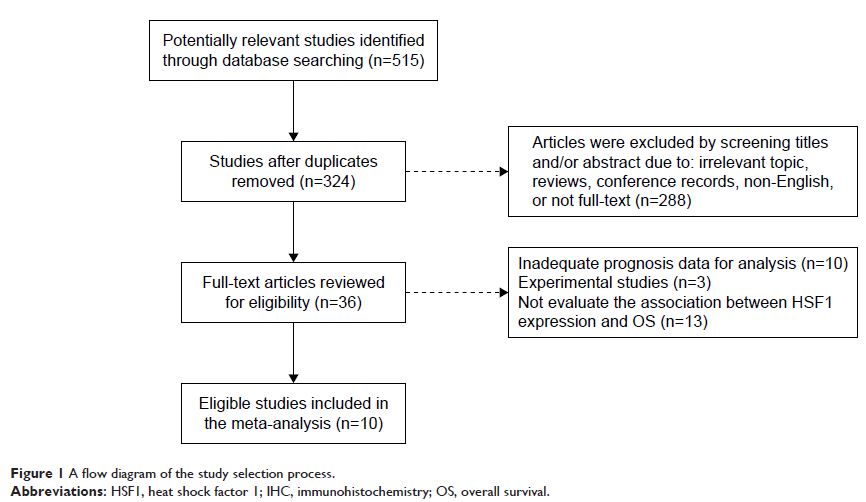108384
论文已发表
注册即可获取德孚的最新动态
IF 收录期刊
- 3.4 Breast Cancer (Dove Med Press)
- 3.2 Clin Epidemiol
- 2.6 Cancer Manag Res
- 2.9 Infect Drug Resist
- 3.7 Clin Interv Aging
- 5.1 Drug Des Dev Ther
- 3.1 Int J Chronic Obstr
- 6.6 Int J Nanomed
- 2.6 Int J Women's Health
- 2.9 Neuropsych Dis Treat
- 2.8 OncoTargets Ther
- 2.0 Patient Prefer Adher
- 2.2 Ther Clin Risk Manag
- 2.5 J Pain Res
- 3.0 Diabet Metab Synd Ob
- 3.2 Psychol Res Behav Ma
- 3.4 Nat Sci Sleep
- 1.8 Pharmgenomics Pers Med
- 2.0 Risk Manag Healthc Policy
- 4.1 J Inflamm Res
- 2.0 Int J Gen Med
- 3.4 J Hepatocell Carcinoma
- 3.0 J Asthma Allergy
- 2.2 Clin Cosmet Investig Dermatol
- 2.4 J Multidiscip Healthc

已发表论文
HSF1 过表达在实体瘤中的预后作用:对 3,159 名患者的汇总分析
Authors Wan T, Shao J, Hu B, Liu G, Luo P, Zhou Y
Received 10 October 2017
Accepted for publication 13 December 2017
Published 17 January 2018 Volume 2018:11 Pages 383—393
DOI https://doi.org/10.2147/OTT.S153682
Checked for plagiarism Yes
Review by Single-blind
Peer reviewers approved by Dr Akshita Wason
Peer reviewer comments 2
Editor who approved publication: Dr Carlos Vigil Gonzales
Background and
objective: HSF1 is reported to be overexpressed in
various solid tumors and play a pivotal role in cancer progression. A
meta-analysis was conducted to assess the potential prognostic role of HSF1 in
patients with solid tumors.
Methods: An extensive electronic search of three databases was performed for relevant articles. The pooled hazard ratios (HRs) or odds ratios with their corresponding 95% CI were calculated with a random-effects model. Heterogeneity and publication bias analyses were also conducted.
Results: A total of 3,159 patients from 10 eligible studies were included into the analysis. The results showed that positive HSF1 expression was significantly correlated with poor overall survival in all tumors (HR=2.09; 95% CI: 1.62–2.70; P <0.001). Subgroup analysis revealed that there was a significant association between HSF1 overexpression and poor prognosis in esophageal squamous cell carcinoma (ESCC) (HR=1.83; 95% CI: 1.21–2.77; P =0.004), breast cancer (BC) (HR=1.52; 95% CI: 1.24–2.86; P <0.001), hepatocellular carcinoma (HR=3.02; 95% CI: 1.77–5.18; P <0.001), non-small-cell lung cancer (HR=2.19; 95% CI: 1.20–3.99; P =0.01), and pancreatic cancer (HR=2.58; 95% CI: 1.11–6.03; P =0.03) but not in osteosarcoma (HR=1.58; 95% CI: 0.47–5.35; P =0.46). In addition, HSF1 overexpression was significantly associated with some phenotypes of tumor aggressiveness including TNM stage, histological grade, lymph node metastasis, and vascular invasion.
Conclusion: HSF1 overexpression may prove to be an unfavorable prognostic biomarker for solid tumor patients.
Keywords: HSF1, solid tumors, prognosis, overall survival, meta-analysis
Methods: An extensive electronic search of three databases was performed for relevant articles. The pooled hazard ratios (HRs) or odds ratios with their corresponding 95% CI were calculated with a random-effects model. Heterogeneity and publication bias analyses were also conducted.
Results: A total of 3,159 patients from 10 eligible studies were included into the analysis. The results showed that positive HSF1 expression was significantly correlated with poor overall survival in all tumors (HR=2.09; 95% CI: 1.62–2.70; P <0.001). Subgroup analysis revealed that there was a significant association between HSF1 overexpression and poor prognosis in esophageal squamous cell carcinoma (ESCC) (HR=1.83; 95% CI: 1.21–2.77; P =0.004), breast cancer (BC) (HR=1.52; 95% CI: 1.24–2.86; P <0.001), hepatocellular carcinoma (HR=3.02; 95% CI: 1.77–5.18; P <0.001), non-small-cell lung cancer (HR=2.19; 95% CI: 1.20–3.99; P =0.01), and pancreatic cancer (HR=2.58; 95% CI: 1.11–6.03; P =0.03) but not in osteosarcoma (HR=1.58; 95% CI: 0.47–5.35; P =0.46). In addition, HSF1 overexpression was significantly associated with some phenotypes of tumor aggressiveness including TNM stage, histological grade, lymph node metastasis, and vascular invasion.
Conclusion: HSF1 overexpression may prove to be an unfavorable prognostic biomarker for solid tumor patients.
Keywords: HSF1, solid tumors, prognosis, overall survival, meta-analysis
